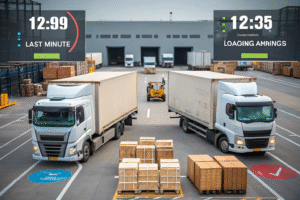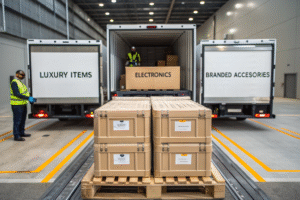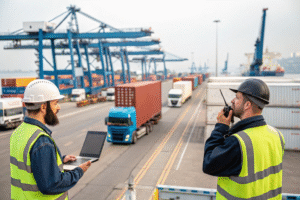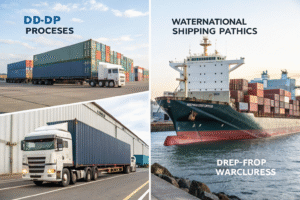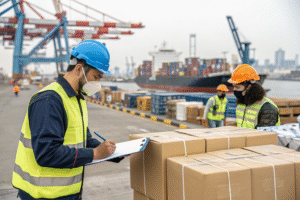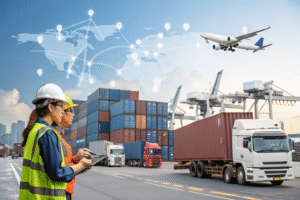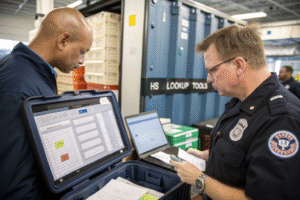If you've ever had a shipment stuck at customs, hit with surprise duties, or delayed because no one booked the final delivery — you know how painful international shipping can be.
DDP (Delivered Duty Paid) shipping solves these problems by making the seller responsible for every step — from the factory in China to your warehouse door, including all customs and taxes.
For busy importers, DDP simplifies everything. You don’t need to deal with brokers, decode tax rules, or manage port paperwork. Here’s why more businesses are switching to DDP.
What is DDP shipping and how does it work?
When shipping internationally, Incoterms define who is responsible for each part of the journey. DDP stands out as the most buyer-friendly option.
DDP shipping means the seller handles the full delivery, including shipping, customs clearance, duty payment, and final delivery. The buyer receives the goods without lifting a finger.
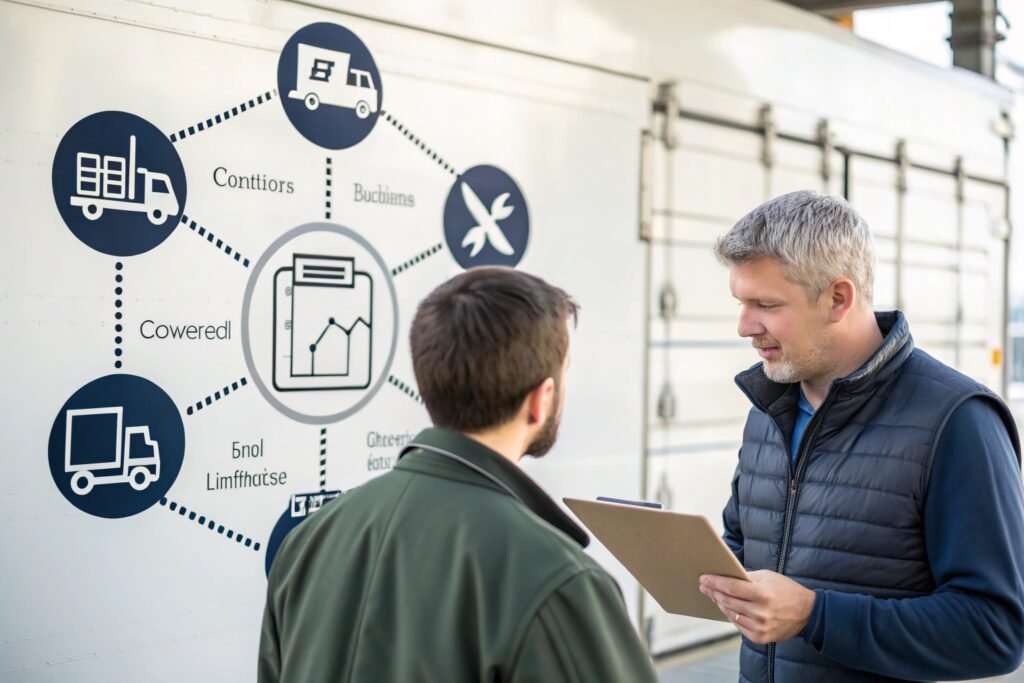
What steps does DDP include?
Let’s break it down from China to the U.S.:
| Step | Handled By (DDP) |
|---|---|
| Pickup from Factory | Seller / Forwarder |
| Export Customs in China | Seller |
| Freight Booking | Seller |
| Import Customs in USA | Seller |
| Duty & Tax Payment | Seller |
| Final Warehouse Delivery | Seller |
In short: you, the buyer, do nothing. You simply wait for your cargo to arrive — cleared, delivered, and paid.
At GeeseCargo, we handle all DDP shipments with proactive tracking, daily updates, and full document control. That’s why clients call us the “one-stop logistics team.”
How is DDP different from other terms?
Other common Incoterms include:
- EXW (Ex Works): You handle everything after the factory
- FOB (Free on Board): Seller delivers to port, then you take over
- DDP: Seller handles everything, door-to-door
This makes DDP ideal for importers who want simplicity and cost predictability.
Key advantages of DDP for importers and buyers
Most buyers just want their goods delivered safely, on time, and at a known cost. DDP is built to do exactly that.
DDP offers full-cost transparency, reduced workload, no customs hassles, and smoother delivery — making it the most convenient solution for international importers.

What are the core benefits of DDP?
Here’s what importers gain with DDP:
| Advantage | Why It Matters |
|---|---|
| No Hidden Charges | All duties, taxes, and fees are included |
| No Customs Knowledge Needed | We handle all documentation and clearance |
| Predictable Delivery | One team oversees the full timeline |
| Reduced Risk | We take responsibility for cargo movement |
| Streamlined Accounting | No unexpected invoices from agents or carriers |
| Time Savings | Focus on your business, not logistics |
One of our U.S. buyers told me, “I used to spend 10–15 emails per shipment just chasing updates. Since moving to DDP, I get one report and one delivery confirmation. That’s it.”
What types of businesses benefit most?
DDP works best for:
- Amazon sellers needing direct FBA delivery
- Small importers without in-house customs brokers
- EU buyers unfamiliar with duty structure
- Time-sensitive product lines with tight launch windows
If your team is focused on sales, branding, or product development, DDP keeps logistics off your plate.
DDP vs. EXW and FOB: which is more convenient?
Many suppliers offer EXW or FOB terms by default. But that doesn’t mean they’re the best for your business. Let’s compare.
Compared to EXW and FOB, DDP offers the most convenience and control over shipping costs. It shifts all logistics responsibility to the seller or forwarder.
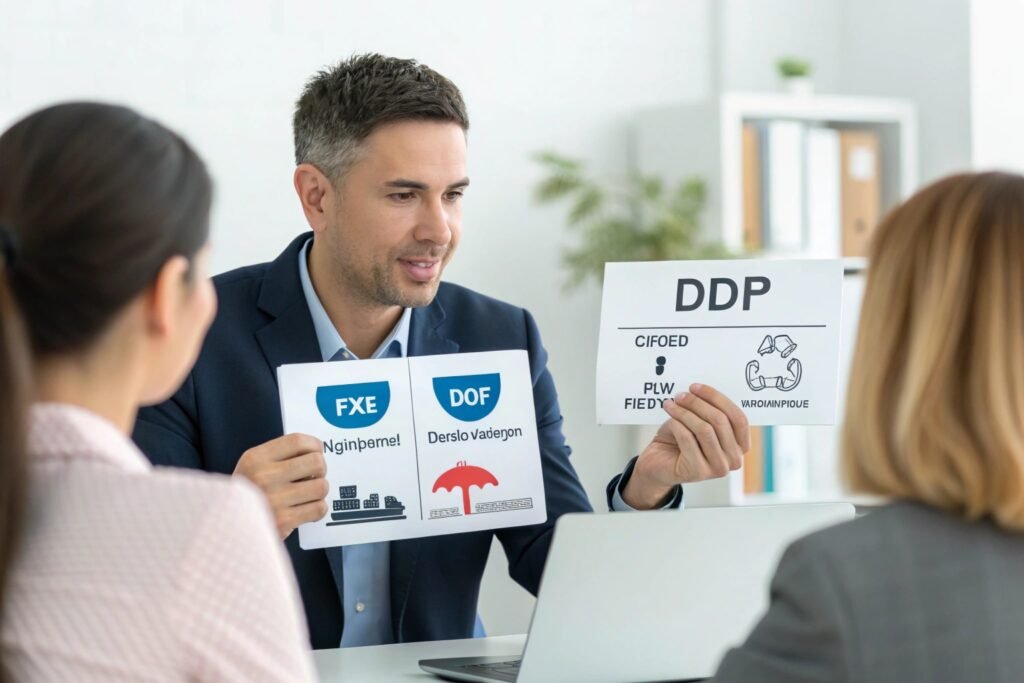
How do these Incoterms differ?
| Feature | EXW | FOB | DDP |
|---|---|---|---|
| Pickup from Factory | Buyer | Buyer | Seller |
| Export Process | Buyer | Seller | Seller |
| Freight Booking | Buyer | Buyer | Seller |
| Import Clearance | Buyer | Buyer | Seller |
| Duties & Taxes | Buyer | Buyer | Seller |
| Final Delivery | Buyer | Buyer | Seller |
| Workload | High | Medium | Low |
| Cost Transparency | Low | Medium | High |
EXW puts all responsibility on the buyer. It’s only ideal for experienced importers who want full control.
FOB is a middle ground — the seller brings cargo to port, but the buyer manages everything else.
DDP is the full-service option — no surprises, no extra work.
At GeeseCargo, we see that new importers often start with EXW or FOB. But after one delayed or rejected shipment, they quickly upgrade to DDP.
How DDP reduces shipping risks and delays
Delays cost money. Every day your shipment sits at customs or the port is a lost sales opportunity — and an added expense. DDP helps avoid these pitfalls.
DDP shipping reduces risk by giving full control to one accountable logistics partner — handling customs, timing, documentation, and delivery.
![]()
What risks does DDP help you avoid?
| Risk | DDP Prevention |
|---|---|
| Customs Delay | We pre-file documents and use experienced brokers |
| Wrong HS Code | We research and declare the correct classification |
| Missing Paperwork | We check every form before shipment |
| Port Storage Fees | We pre-book clearance to avoid demurrage |
| Delivery Failure | We arrange final-mile delivery with trusted partners |
One client’s LCL cargo once got stuck at the New York port for 7 days due to an EXW-related paperwork error. When they switched to our DDP service, we took over the customs work — and they haven’t had a delay since.
Is DDP always the safest option?
For most SMEs and growing importers, yes. There are cases where companies prefer control (like managing their own bonded warehouse or optimizing duty costs), but for 90% of businesses, DDP means:
- Less confusion
- Fewer contacts
- Faster delivery
- No surprises
That’s the foundation of a healthy international supply chain.
Conclusion
DDP shipping turns a complex, multi-step international shipping process into a simple, reliable experience. By handing off logistics, customs, and final delivery to professionals, importers save time, reduce risk, and gain cost clarity — all of which lead to smarter growth and smoother trade.

